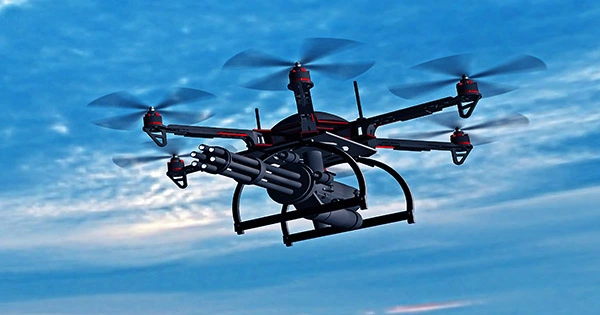Many merciless and emotionally devastating school shootings have occurred in America in recent months. Many remedies to the shooting pandemic have been presented, including new gun restrictions and arming teachers; however, these options are frequently debated, and no resolution appears to be on the horizon very soon. Axon (previously Taser) claimed this week that non-lethal armed drones in schools are vital to preventing mass shootings, which its own ethics board has rejected. According to Axon, drones outfitted with non-lethal weaponry might successfully combat mass shootings by preventing them or at the very least reducing the severity of the aftermath.
The business suggests that the technology be used in and near schools, and that if drones are needed, they could be launched remotely and incapacitate a gunman in under 60 seconds. “Now is the time to make this technology a reality,” said Axon CEO and Founder Rick Smith, “and to begin a strong public dialogue around how to responsibly deploy nonlethal drones into schools.”
Despite this official declaration, the corporation’s own ethics board is not pleased, and they had to publish a follow-up statement with their reservations just hours after the announcement. The notion of a Taser-equipped drone was submitted to Axon’s AI Ethics Board over a year ago, and the board has been debating it ever since, according to a statement from the board. “With Axon’s approval, the Ethics Board opted to only examine a limited pilot of a Taser-equipped drone for police use… After doing this work and deliberating for a long time, a majority of the ethics board decided against Axon continuing forward, even on those restricted parameters, last month.”
Weaponized drones might worsen situations and “increase the rate at which force is utilized, especially in over-policed neighborhoods and communities of color,” according to the ethics board. Axon, on the other hand, opted to openly reveal its ambitions to build the guns, which would be available to all law enforcement departments.
When questioned in a Reddit AMA about the purpose of an ethics board, Smith said, “Our advisory board is independent.” When asked whether Axon believes they are better able to evaluate what is and isn’t beneficial for society, Smith responded, “Our advisory board is independent.” They are free to disagree with us. That is, in some ways, the goal. However, the purpose of this conversation is for us to hear those points of view. We haven’t released a product yet; instead, we’ve released an idea. And I’d want to hear from anyone who disagrees, including our advisory board.”
The ethics committee is so dissatisfied that Wael Abd-Almageed (a board member) informed Reuters that he and eight other members of the committee are departing, leaving only four persons on it. Ethics committees are an important aspect of technology firms because they may collect input and act as a conduit for concerns that corporations might not otherwise hear about. As a result of the outcry over this non-lethal weapon drone idea, Axon has decided to put the project on hold. “We are stopping work on this initiative in light of comments and refocusing to further engage with important constituents to properly consider the best way ahead,” Smith said in a statement.













